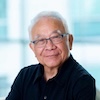A panel of experts came together for the Morgridge Institute’s Fearless Science Forum series on November 13 to explore “The Case for Curiosity: Why Discovery-Driven Research Matters.”
Morgridge CEO Brad Schwartz was joined by Kevin Conroy, CEO of Exact Sciences, and Keith Yamamoto, a national leader in science policy and former Vice Chancellor for Science Policy and Strategy at the University of California, San Francisco and former Chairman of the Board on Life Sciences at the National Academy of Sciences. Lisa Johnson, CEO of BioForward, gave the opening remarks.
The following is an abridged summary highlighting remarks from the panelists. A recording of the full discussion can be viewed in full above.
Schwartz opened the panel by introducing the idea that scientists are responsible for keeping science a “healthy and vigorous” pursuit that works for the benefit of society. During the early foundation of the Morgridge Institute, Schwartz noted that “society’s greatest invention” is the public research university — a place where faculty could delve into topics they found endlessly fascinating, and to make discoveries with results that could be trusted.
The Morgridge Institute was designed around the idea of fearless science, structured to help scientists push into new frontiers of biology, rather than work around the edges of what’s already known. In partnership with UW–Madison, Morgridge investigators are invited to follow their curiosity, and are given the freedom and support to go where the science leads them.

Brad Schwartz
“Once you know how something really works, that information will be valuable. You may not know when it will be valuable, you may not know how it will be valuable, but somebody will come along and say, ‘I can do something with that.’
In some respects, we have — this is going to be a funny word to associate with research, but history has proven that it’s true — we have to have faith that these discoveries are going to prove themselves to be valuable in ways that we cannot anticipate.”
Conroy emphasized that without basic research, Exact Sciences would not be the company they are today. It takes a long time to get a company off the ground, and it can be difficult to fund a nascent company over a long period of time. It was because of the combined curiosity of founder Stan Lapidus, colon cancer researchers Bert Vogelstein and David Ahlquist, whose early meetings fueled the change for Exact Sciences to find success.

Kevin Conroy
“Still, the most successful companies are the ones who go back to the basic science, and, and don’t just develop the product. They really, truly start with that curiosity driven insight and, and keep a team of people who are focused. They are looking they’re scouring the universe, the world for the best ideas and and at some point, the alchemy of what they do kind of becomes real. And they convince a product development person to take that idea and fuze it into a product.”
Yamamoto commented that funding agencies are currently quite conservative in their standards, often driven by research publications as the proven metric for success, while penalizing big, bold ideas — because what if that idea turns out to be wrong? He argued that this standard needs to change to be more forward-looking and curiosity-driven work should be celebrated. Because if that big idea turns out to be correct, it will have enormous impact on society.

Keith Yamamoto
“Humans, it turns out, are innate scientists. They’re curious. They want to explore, to understand things. Kids drive their parents crazy by asking how and why every five minutes, they take apart their toys and your gardening tools to understand how they work. They’re thrilled by discovery. They consider it, exciting and fun to know something that their family and friends don’t know. So basic scientists are humans who choose to engage that curiosity, that innately human characteristic, for a living — to know things that no one else knows, for a living. What we’re looking for in students who aspire to do science, is that spark of curiosity that has at its endpoint the potential to improve life and advance society.”